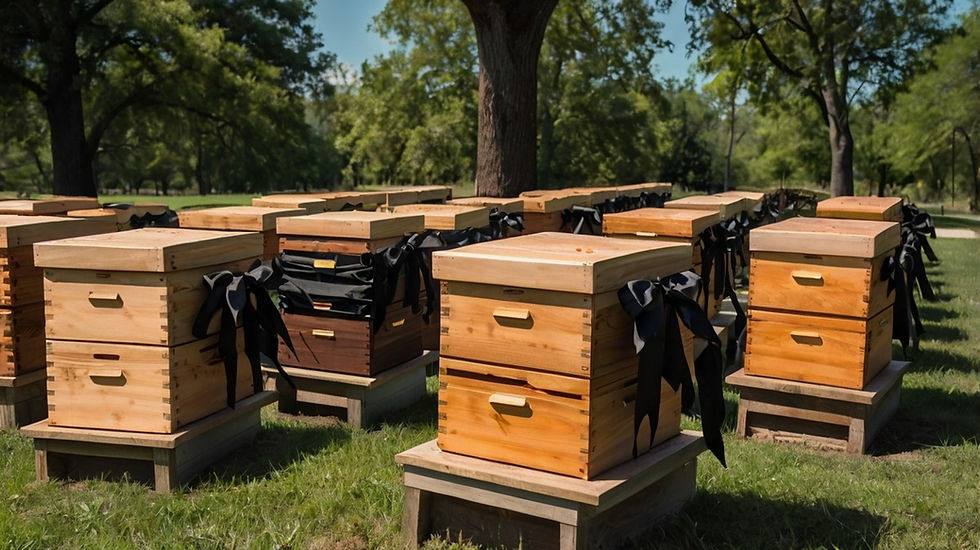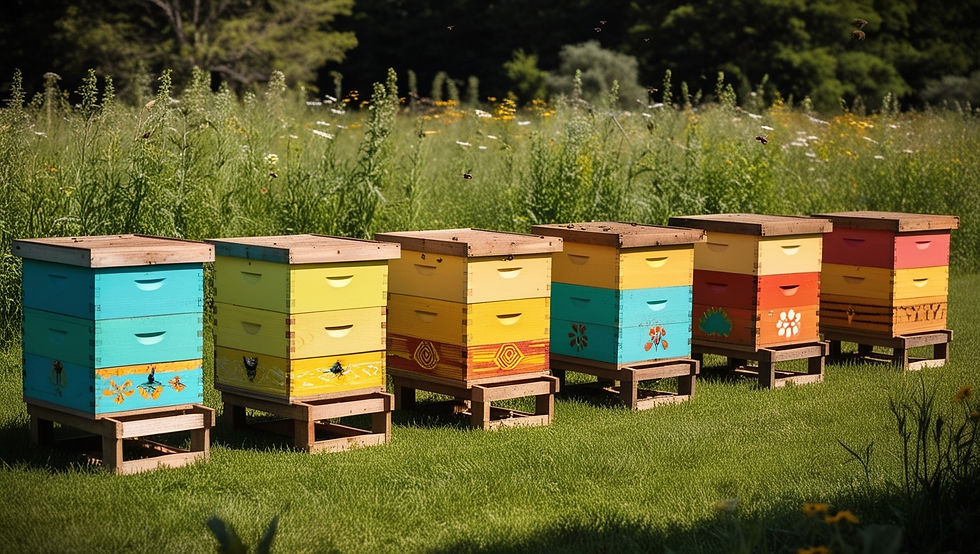
Why People Believe Their Bees Must Be Told of Life’s Changes.
Beyond their practical importance, bees have also held a deeper, almost mystical significance in many cultures throughout the world.
Bees were considered part of the family, and neglecting to inform them of important events, especially deaths, could have dire consequences for the human families that kept them.
This custom, once widespread across Europe and parts of North America, reveals a profound connection between humans and the natural world, a belief that bees were not merely insects, but sentient beings, intimately intertwined with the fortunes of their keepers.
The practice of telling the bees wasn't a singular, monolithic ritual. It varied considerably across regions and cultures, reflecting the unique beliefs and customs of different communities.
The rationale behind this belief is shrouded in the mists of time, but it likely stems from a combination of animistic beliefs, folklore, and a deep respect for the role bees played in the lives of agrarian societies.

A Tap on the Hive
The act of telling the bees was often a solemn and ritualistic affair. Typically, the beekeeper, or a designated member of the family, would approach the hive, often draped in mourning attire or carrying a symbolic object like a black cloth.
They would gently tap on the hive, a signal to the bees that something important had occurred. Then, in a hushed voice, they would relay the news – the death of a family member, a birth, a marriage, or even a departure.
The language used was often formal and respectful, as if addressing esteemed guests. Sometimes, specific details about the deceased, such as their name, age, and relationship to the family, would be shared with the bees.
Variations in the ritual were numerous. In some regions, the hives would be adorned with black crepe or other symbols of mourning. In others, a piece of the deceased's clothing might be placed on the hive.
Some beekeepers believed that the bees needed to be told the news three times, while others held that a single, heartfelt announcement was sufficient. The time of day for telling the bees also varied, with some preferring the quiet of dawn or dusk, while others believed it was best to inform the bees immediately after the event.
Cultural Nuances and Many Different Beliefs
The specific customs associated with telling the bees varied significantly across different cultures and regions, offering a glimpse into the diverse beliefs surrounding the bees.
In the British Isles: In some parts of Britain, the tradition was deeply ingrained in rural life. Bees were believed to be particularly sensitive to death, and neglecting to tell them could result in the bees swarming or abandoning the hive altogether.
The practice was so prevalent that specific rhymes and incantations were sometimes used when addressing the bees. For example, in some areas, the beekeeper would chant: "The master's dead, and so are you; We must be all put in the ground, and you must work for some one new."
In Continental Europe: Similar traditions existed across continental Europe, with variations in the specific rituals and beliefs. In some regions, the bees were believed to be messengers of the gods, and telling them of important events was seen as a way of invoking divine favor.
In other areas, the bees were associated with the souls of the departed, and informing them of a death was a way of ensuring the deceased's peaceful transition to the afterlife.

In North America: European settlers brought the tradition of telling the bees to North America, where it became particularly prevalent in rural communities. While the core beliefs remained the same, the rituals often blended with local Native American traditions, creating unique regional variations.
In Ireland: Families left whiskey and sandwiches by hives during wakes, blending Gaelic hospitality with bee lore. In Cork, bees were said to follow their keeper’s funeral procession, forming a “cloud overhead” as a final tribute.
In Bohemia: Author Božena Němcová’s 1855 novel Babička immortalized the tradition, urging descendants to “tell the bees” to prevent hive collapse.
Beyond Europe: While the most well-documented instances of telling the bees come from Europe and the places where Europeans settled, similar beliefs and practices may have existed in other parts of the world, though they may not have been as widely recorded.
Further research into the folklore and beekeeping traditions of different cultures could potentially reveal similar connections between humans and bees.
Cultural Legacy and a Royal Goodbye
Though industrialization eroded the tradition, its echoes persist:
Literature and Art: John Greenleaf Whittier’s 1858 poem “Telling the Bees” captured the ritual’s poignancy, while modern works like Jo Shapcott’s “I Tell the Bees” reimagined it through contemporary lenses.
Royal Endorsement: The death of Queen Elizabeth II in 2022 saw Royal Beekeeper John Chapple draping palace hives in black ribbons, affirming the tradition’s enduring resonance: “The mistress is dead, but don’t you go. Your master will be a good master to you.”
The Decline of a Tradition and a Changing World
With the advent of modern beekeeping practices and the increasing urbanization of society, the tradition of telling the bees has gradually declined.
The close connection between humans and the natural world that underpinned this custom has become less prevalent in contemporary life. However, the practice still persists in some rural communities, a testament to the enduring power of tradition and the deep respect for the bees.
The Enduring Significance is More Than Just a Superstition
While some might dismiss telling the bees as mere superstition, it represents something far more profound. It speaks to a time when humans lived in closer harmony with nature, recognizing how we are connected to all living things.
The practice reflects a deep respect for bees, not just as producers of honey, but as integral members of the family and community, possessing a wisdom and sensitivity that humans could only partially understand.
The tradition of telling the bees serves as a reminder of the human beliefs and practices surrounding the natural world. It reminds us that our relationship with other creatures is not just transactional, but also deeply cultural and spiritual.
By understanding and appreciating these traditions, we can gain a deeper understanding of ourselves and our place in the world, and perhaps rediscover the sense of wonder and connection that our ancestors felt for the whispers in the hive.
While the buzz of the hive may have faded somewhat in our modern world, the echoes of this ancient practice continue to resonate, reminding us of how far we have strayed from the natural world and a simpler life.
Yet, these whispers from the past also offer hope — a chance to reconnect with the rhythms of nature, to honor the wisdom of our ancestors, and to find balance in a world that often feels too fast, too loud, and too disconnected.
In the gentle hum of the bees, we might just rediscover a quieter, kinder way of living, one that celebrates our place within the web of life rather than apart from it.
Betsy and Pete
Las Vegas, Nevada
About Us: The Authors

We're Betsy and Pete, passionate Las Vegas beekeepers trained by a master in the field. With hundreds of successful bee and bee swarm removals under our belts, we're not just experts; we're enthusiasts committed to the well-being of these incredible pollinators.
We manage dozens of beehives, both natural and honey-bearing at our Joshua Tree Preserve.
Our Commitment to Excellence
Education is an ongoing journey, especially in a dynamic field such as beekeeping. That's why we continually update our knowledge base, collaborate with other experts, and stay up to date with the latest advancements in bee control methods and beekeeping practices.
We also provide top-tier beekeeping supplies, offering everything a beekeeper needs, from beginners to experts.
.png)